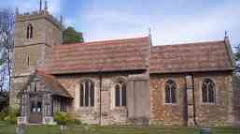 A couple of weeks ago, while looking for something else, I ran across a copy of the Report of the 20/20 Task Force of the Episcopal Church, produced in 2000-2001 at the request of the General Convention. For a few minutes I thumbed through its pages, remembering the rising sense of excitement experienced by those of us who were part of that Task Force, and drew up the report. Now the Report was far from perfect, but looking back over the work we had done I realized afresh that our prognosis and prescription, if applied, could have done a significant amount positively for the Episcopal Church.
A couple of weeks ago, while looking for something else, I ran across a copy of the Report of the 20/20 Task Force of the Episcopal Church, produced in 2000-2001 at the request of the General Convention. For a few minutes I thumbed through its pages, remembering the rising sense of excitement experienced by those of us who were part of that Task Force, and drew up the report. Now the Report was far from perfect, but looking back over the work we had done I realized afresh that our prognosis and prescription, if applied, could have done a significant amount positively for the Episcopal Church.The 20/20 Initiative was deceptively simple: it was to do all that we can to double the size of the Episcopal Church between 2000 and 2020. Such notions have visionary potential, and we felt that as we did our work, this was more about launching a movement rather than becoming mired in a program. Perhaps those of us who were part of the 20/20 Task Force were naive, but we were cautiously optimistic that our recommendations would be taken seriously, and if that happened that they would bring a fresh evangelistic fervor to the church. Doubling the size may have been a little optimistic, but we believed that the Episcopal Church was capable of a good crack at that sort of challenge.
A few days after I had reacquainted myself with the 20/20 Report the 2008 Episcopal Church statistics were published. They do not make happy reading. While numbers may not be everything, they are a record of just about wholesale retreat on every front. Rather than being twice the size it was by 2020, things will be going well if it is only half the size. And like a patient ignoring the doctor's warning after a full physical comes up with some disturbing outcomes, the denomination continues to deny the realities.
We had worked hard during 2000 and 2001 to come up with this Report, which we then took to the Executive Committee in October 2001. It was hardly a fortuitous moment for the nation was still reeling from the shock of 9/11, so grief and anxiety were never far from the surface. But we made the best of the opportunity.
The Executive Council was meeting at a pleasant hotel on the Jacksonville Beaches in Florida, but even before we made our presentation I sensed a degree of hostility toward what we were all about. Our potential agenda was passe, another was brewing and would eventually prevail. We would, no doubt, be indulged, it was highly likely that the product we presented would be watered down to the point of being neutralized, with the institution pulling its teeth and domesticating it. That is precisely what happened.
The agenda which prevailed, and which would start having its most significant impact around the General Convention of 2003, was already gathering momentum. Since that time the church has been divided, financial resources have been dwindling, and the shrinkage has been nothing short of disasterous. Congregations, clergy, bishops, dioceses, have headed for the exits, with litigation being used as never before in the history of the Episcopal Church. Church planting, which was an encouraging component of church life in 2000, is virtually at a standstill, and heads are buried deep in the sand whenever anyone attempts to make honest sense of the truly appalling statistics that get dished up now each year. What is bizarrely fascinating is that no one seems to have the heart to ask the very difficult questions of this distressing reality, or act constructively upon them.
For me, the final chance of an exciting future for the Episcopal Church was nailed into the coffin not during General Convention 2003, but at that meeting of the Executive Council in a comfortable hotel by the beach in Florida in 2001, when the 20/20 Report was received with phony smiles and blue-penciled to death. I think that was when the Episcopal Church broke my heart, what followed from that time was merely a further trampling of it into the dust. That was when I retreated, burying myself back in parish ministry and avoiding the national scene.
It was, however, while I was at that hotel in Jacksonville Beach that I had the worst nocturnal experience of my life. Not long after switching off the light one night, and when I wasn't sure whether I was asleep or partially awake, I found myself face-to-face with a kind of gray featureless creature which was doing its level best to suffocate me. I was in terror, and truly thought I was dead and was being dragged down to hell. My body thrashed as I fumbled for the light switch. When eventually I managed to illuminate the room I was alone, drenched in sweat, heart pounding like a sledgehammer, and frightened out of my wits. It was a long time before I was calm enough to face the darkness again, and try to get back to sleep.
I have spent eight years attempting to make sense of that episode, whose reality is as intense and frightening today as when it happened. Did it emanate from somewhere inside me? Was it something to do with the room in which I was staying? Did it have something to do with the recent events at Ground Zero and the Pentagon? Or, perhaps, was it related in some way to the spiritual conflict related to the Executive Council meeting? I cannot answer these questions with any sense of certainty, which would be presumptuous. It may have been due to none of the above, or all of them may have somehow contributed to this particularly unpleasant situation.
What I do know is that imperfect as the proposals of the 20/20 Report might have been, the Episcopal Church would have been a very different place today if the strategy suggested had been pursued. If a red-blooded 20/20 had happened perhaps there would not have been the agonizing parting of friends, perhaps the financial dilemmas would be ameliorated, and perhaps the challenge would have continued to be planting new congregations, while training to recruit and train the sort of leaders who could nurture these little green shoots and turn them into something significant.
During these last years there have been many casualties, and perhaps I am one of them. I remain a priest in good standing of the Episcopal Church, but my ministry is now an ocean away. I find what I am doing fulfilling, satisfying, and (I hope) making a constructive contribution to the advance of God's Kingdom. However, the temperature of my passions starts to rise when I think of the extraordinary adventure 20/20 would have been as a movement in the hands of the Holy Spirit.




